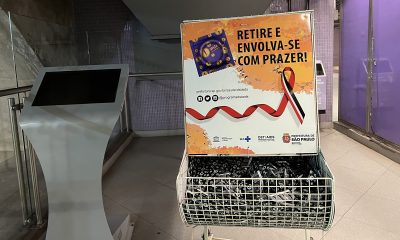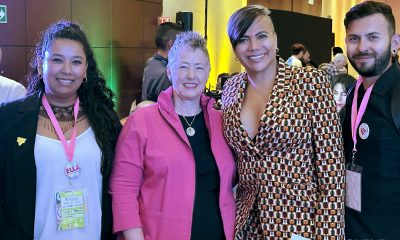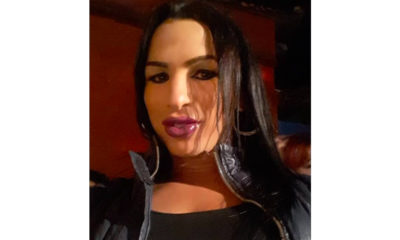homepage news
Constitutional debate in Cuba will not be televised
Meetings an opportunity to debate marriage, other issues
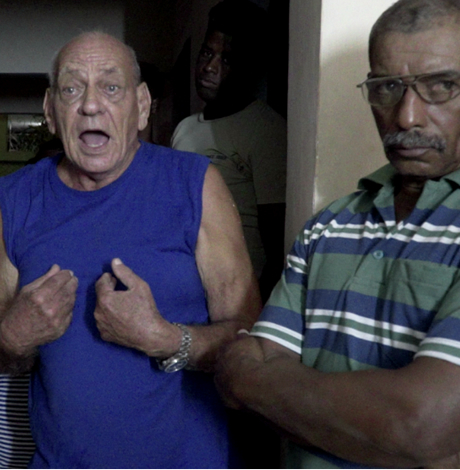
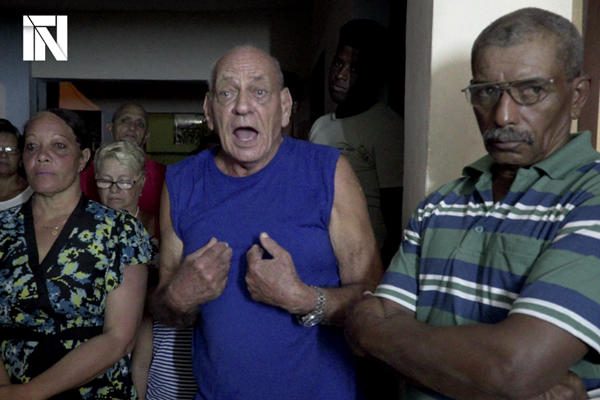
(Photo by Claudia Padrón Cueto/Tremenda Nota)
Tremenda Nota originally published this story on its website in Spanish on Nov. 7.
HAVANA — In Cuba, the debates around the draft constitution in local neighborhoods are much broader than what appears on television.
Some people want the president to be free to serve unlimited terms in office; to ban same-sex marriage and to make work “compulsory,” while others want direct elections and the right to protest.
In the Casino Deportivo neighborhood of Havana’s Cerro municipality, the Committee for the Defense of the Revolution (CDR) No. 3 has had no leader since the president left three years ago. A resident says that no one else has wanted to “get involved in that.”
People only discovered that the draft constitution was going to be debated on Monday because of a few posters stuck onto electricity posts by a state official. The posters announced: “A meeting for Casino Deportivo’s CDRs No. 3 and No. 6 in Cerro at 8 p.m. on Calle Cuarta.”
At the designated meeting time 35 people form a semi-circle around a table. Marlén Suárez, a Cuban Communist Party official (PCC), stands in front of the group to lead the meeting. She is joined by Pedro Santana, a delegate of the Municipal Assembly of People’s Power, representing the residents of District 82. It is their third meeting in 10 days. Once again the national anthem is sung, there is a Cuban flag and a recording secretary takes minutes.
Lina, a resident in CDR No. 6, wastes no time and, adjusting her glasses, interrupts. Her copy of the draft constitution is completely covered with notes and scribbles. She says that the state should not just promote economic development but guarantee it, to prevent young people from migrating. She argues that work should be compulsory. However, Miguel, a local small business owner, contends that first there should be decent wages. He counters, “That’s what should be compulsory.”
Lina pretends not to hear him and continues: “In Article 40 they should remove discrimination based on gender or gender identity. Sex and sexual orientation is sufficient.”
A young woman interrupts to explain that gender and sex are not the same thing and goes on to distinguish them. Lina insists that gender is unnecessary, “Cubans do not understand such academic concepts.” The young woman responds, “In Cuba barely anyone has read El Capital, hardly anyone understands Marxism but we have been quoting Marx for 60 years.”
Almost an hour later Marlén interrupts with renewed energy: “It’s time for controversial Article 68.” “Controversial Article 68,” as the party official calls it, modifies and expands the concept of marriage in Cuba, which has so far been restricted to the union between a man and woman.
“No one wants to talk about this?” No one speaks. “Are you sure?” she insists.
Finally, retiree Mario responds to Marlén’s question, blurting out, “I don’t agree…It’s unnatural and goes against communism. Also our religious comrades don’t approve. A measure like this is only going to divide the country.”
He goes on to say that “this” (it is not clear whether he is referring to divisions or to same sex marriage) “is what the enemy wants.” María, another retiree and grandmother of two girls, supports Mario. She is concerned about the new kinds of families that the constitutional change will produce. “How can a child live with two men? Who will they call mother? What values will they learn? They’ll teach them to be homosexuals!”
Only one young woman responded, “So it’s on the record that not everyone is against same sex marriage.” Mario and María argued that “society isn’t ready.” However, the young woman argues, “You don’t vote on rights. In this case the constitution doesn’t take anything from anyone, rather it gives rights to those who didn’t have any.”
Prieto, a middle-aged local man, broke with the debate’s predictable script, “In Cuba we need elections with direct votes, the right to peaceful protest and to finalize the unification of the currency,” he added boldly.
He also argued for the abolition of the law preventing professionals who “abandon” an international mission to return to Cuba for an eight-year period. He also asked to make it legal for the “proletariat” to take “motor boat” rides.
After each of Prieto’s points, Marlén states, “Well, that’s his personal opinion. You have to respect it.”
The draft constitution does not mention the dual currency, or the laws that limit the return of Cuban professionals who “deserted” Cuba, or the ban on taking recreational boat rides, which all weigh heavy on Cubans. The Communist Party official suggests that the proposed constitution has “other characteristics, other purposes.” But Prieto insists that his opinions be included in the minutes.
At moments the debate on the constitution seems more like a call to the delegate’s accountability to his community. People take advantage of the circumstances to complain about scarcity in farmers’ markets, potholes, water leakages or the limitations of the transportation system. The constitutional debate provides an opportunity for catharsis with party officials.
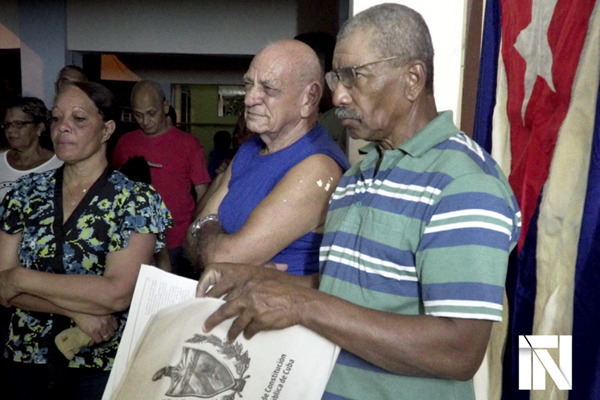
According to the official media more than 135,000 meetings will be held throughout the country, in places of work and study, in communities and abroad. (Photo by Claudia Padrón Cueto/Tremenda Nota)
By 9:30 p.m. the meeting has run overtime and Prieto continues to argue with another Communist Party representative, a man with a moustache wearing a guayabera shirt. Prieto does not understand what type of socialism is being built, “Is it the 21st century [communism], is it Chinese or Korean?”
The official becomes irritated, arguing that we have never copied any model and that “few countries exist that are as free and democratic.” And that, of course, “We are building a Cuban socialism.”
Another 10 minutes go by. Marlén sighs and fidgets in her chair, the recording secretary turns over a page and continues writing. People start to quietly leave. The closing theme song of the Brazilian soap opera draws participants like a magnet.
An English man at the meeting
Fourteen people are waiting for Marlén Suárez, the Communist Party official running the debate, in front of the old CDR Number 1 office (District 82). One woman is playing Candy Crush on her phone while others chat with the draft constitution tucked under their arms. A foreign journalist is carrying a tripod and a Canon camera.
Someone says, “The meeting is going to be broadcast on an international channel.” The Communist Party official gulps and searches for a number, she goes to the public telephone, dials and explains to her superior on the other end of the line that a foreign journalist wants to “film everything.” She immediately starts to fire questions into the phone: Is filming the meeting authorized? What should she do? Is it allowed or not?
“What media do you represent?” She asks the reporter without hanging up.
“The Guardian,” he responds with an English accent, showing his photo ID.
Marlén breaks the newspaper’s name down to syllables: de-gar-dian. It seems that neither she or her superior know who the correspondent is, what the Guardian is or what the Cuban revolution thinks.
Finally, Marlén agrees and the reporter presses record.
In the first shot the official asks attendees to sing the anthem, “Very loudly so you can hear the dedication.” The recording secretary is taking notes in the background. A Cuban flag is tied to a railing.
The anthem finishes. Marlén reads a text by Fidel Castro, the Concept of Revolution, loud and clear. She also “shares” the forward of the draft constitution and requests residents’ opinions chapter by chapter.
Except for the delegate Pedro Santana, those present barely say a word. Santana wants to make it clear that there has never been religious, or any other kind of discrimination in Cuba. “Here we only pursue those who try to change the system.” The delegate pauses, then corrects himself, “Actually, they are not pursued, they are controlled.”

Pedro Santana, the delegate, first on the left, explains the importance of “constitutional reform” to the locals. (Photo by Claudia Padrón Cueto/Tremenda Nota)
There are few comments until Article 121, which refers to electing the president.
Calixto, who is 80 years old and from Manzanillo, Granma, does not believe there should be a limit to the age or number of terms a president can serve. “And if we have another Fidel?” he asks, “With that measure we could truncate the presidency of an exceptional man.”
The others agree. Some applaud.
Orquídea, a former official from the Department of Migration and Foreign Affairs, does not agree that Cubans must return to the country every two years to maintain their residency. Also, Félix, the owner of a nearby café, thinks it is unfair to prohibit the accumulation of wealth when it comes from honorable work.
The meeting ends just after 9 p.m. The English journalist asks the delegate and the woman running the debate to stay a little longer to chat. Pedro agrees but Marlén refuses to give an interview in her role as an official, explaining that, “It isn’t appropriate to appear in the foreign press.”
Before leaving the president of the CDR (the same woman who was playing Candy Crush) reminds the recording secretary to “include in the attendants those who weren’t present because of illness or because they had to work.” She takes out a paper with several people’s names and with a few strokes of a pen multiplies the 14 people attending the debate.
homepage news
Honoring the legacy of New Orleans’ 1973 UpStairs Lounge fire
Why the arson attack that killed 32 gay men still resonates 50 years later

On June 23 of last year, I held the microphone as a gay man in the New Orleans City Council Chamber and related a lost piece of queer history to the seven council members. I told this story to disabuse all New Orleanians of the notion that silence and accommodation, in the face of institutional and official failures, are a path to healing.
The story I related to them began on a typical Sunday night at a second-story bar on the fringe of New Orleans’ French Quarter in 1973, where working-class men would gather around a white baby grand piano and belt out the lyrics to a song that was the anthem of their hidden community, “United We Stand” by the Brotherhood of Man.
“United we stand,” the men would sing together, “divided we fall” — the words epitomizing the ethos of their beloved UpStairs Lounge bar, an egalitarian free space that served as a forerunner to today’s queer safe havens.
Around that piano in the 1970s Deep South, gays and lesbians, white and Black queens, Christians and non-Christians, and even early gender minorities could cast aside the racism, sexism, and homophobia of the times to find acceptance and companionship for a moment.
For regulars, the UpStairs Lounge was a miracle, a small pocket of acceptance in a broader world where their very identities were illegal.
On the Sunday night of June 24, 1973, their voices were silenced in a murderous act of arson that claimed 32 lives and still stands as the deadliest fire in New Orleans history — and the worst mass killing of gays in 20th century America.
As 13 fire companies struggled to douse the inferno, police refused to question the chief suspect, even though gay witnesses identified and brought the soot-covered man to officers idly standing by. This suspect, an internally conflicted gay-for-pay sex worker named Rodger Dale Nunez, had been ejected from the UpStairs Lounge screaming the word “burn” minutes before, but New Orleans police rebuffed the testimony of fire survivors on the street and allowed Nunez to disappear.
As the fire raged, police denigrated the deceased to reporters on the street: “Some thieves hung out there, and you know this was a queer bar.”
For days afterward, the carnage met with official silence. With no local gay political leaders willing to step forward, national Gay Liberation-era figures like Rev. Troy Perry of the Metropolitan Community Church flew in to “help our bereaved brothers and sisters” — and shatter officialdom’s code of silence.
Perry broke local taboos by holding a press conference as an openly gay man. “It’s high time that you people, in New Orleans, Louisiana, got the message and joined the rest of the Union,” Perry said.
Two days later, on June 26, 1973, as families hesitated to step forward to identify their kin in the morgue, UpStairs Lounge owner Phil Esteve stood in his badly charred bar, the air still foul with death. He rebuffed attempts by Perry to turn the fire into a call for visibility and progress for homosexuals.
“This fire had very little to do with the gay movement or with anything gay,” Esteve told a reporter from The Philadelphia Inquirer. “I do not want my bar or this tragedy to be used to further any of their causes.”
Conspicuously, no photos of Esteve appeared in coverage of the UpStairs Lounge fire or its aftermath — and the bar owner also remained silent as he witnessed police looting the ashes of his business.
“Phil said the cash register, juke box, cigarette machine and some wallets had money removed,” recounted Esteve’s friend Bob McAnear, a former U.S. Customs officer. “Phil wouldn’t report it because, if he did, police would never allow him to operate a bar in New Orleans again.”
The next day, gay bar owners, incensed at declining gay bar traffic amid an atmosphere of anxiety, confronted Perry at a clandestine meeting. “How dare you hold your damn news conferences!” one business owner shouted.
Ignoring calls for gay self-censorship, Perry held a 250-person memorial for the fire victims the following Sunday, July 1, culminating in mourners defiantly marching out the front door of a French Quarter church into waiting news cameras. “Reverend Troy Perry awoke several sleeping giants, me being one of them,” recalled Charlene Schneider, a lesbian activist who walked out of that front door with Perry.

Esteve doubted the UpStairs Lounge story’s capacity to rouse gay political fervor. As the coroner buried four of his former patrons anonymously on the edge of town, Esteve quietly collected at least $25,000 in fire insurance proceeds. Less than a year later, he used the money to open another gay bar called the Post Office, where patrons of the UpStairs Lounge — some with visible burn scars — gathered but were discouraged from singing “United We Stand.”
New Orleans cops neglected to question the chief arson suspect and closed the investigation without answers in late August 1973. Gay elites in the city’s power structure began gaslighting the mourners who marched with Perry into the news cameras, casting suspicion on their memories and re-characterizing their moment of liberation as a stunt.
When a local gay journalist asked in April 1977, “Where are the gay activists in New Orleans?,” Esteve responded that there were none, because none were needed. “We don’t feel we’re discriminated against,” Esteve said. “New Orleans gays are different from gays anywhere else… Perhaps there is some correlation between the amount of gay activism in other cities and the degree of police harassment.”

An attitude of nihilism and disavowal descended upon the memory of the UpStairs Lounge victims, goaded by Esteve and fellow gay entrepreneurs who earned their keep via gay patrons drowning their sorrows each night instead of protesting the injustices that kept them drinking.
Into the 1980s, the story of the UpStairs Lounge all but vanished from conversation — with the exception of a few sanctuaries for gay political debate such as the local lesbian bar Charlene’s, run by the activist Charlene Schneider.
By 1988, the 15th anniversary of the fire, the UpStairs Lounge narrative comprised little more than a call for better fire codes and indoor sprinklers. UpStairs Lounge survivor Stewart Butler summed it up: “A tragedy that, as far as I know, no good came of.”
Finally, in 1991, at Stewart Butler and Charlene Schneider’s nudging, the UpStairs Lounge story became aligned with the crusade of liberated gays and lesbians seeking equal rights in Louisiana. The halls of power responded with intermittent progress. The New Orleans City Council, horrified by the story but not yet ready to take its look in the mirror, enacted an anti-discrimination ordinance protecting gays and lesbians in housing, employment, and public accommodations that Dec. 12 — more than 18 years after the fire.
“I believe the fire was the catalyst for the anger to bring us all to the table,” Schneider told The Times-Picayune, a tacit rebuke to Esteve’s strategy of silent accommodation. Even Esteve seemed to change his stance with time, granting a full interview with the first UpStairs Lounge scholar Johnny Townsend sometime around 1989.
Most of the figures in this historic tale are now deceased. What’s left is an enduring story that refused to go gently. The story now echoes around the world — a musical about the UpStairs Lounge fire recently played in Tokyo, translating the gay underworld of the 1973 French Quarter for Japanese audiences.
When I finished my presentation to the City Council last June, I looked up to see the seven council members in tears. Unanimously, they approved a resolution acknowledging the historic failures of city leaders in the wake of the UpStairs Lounge fire.
Council members personally apologized to UpStairs Lounge families and survivors seated in the chamber in a symbolic act that, though it could not bring back those who died, still mattered greatly to those whose pain had been denied, leaving them to grieve alone. At long last, official silence and indifference gave way to heartfelt words of healing.
The way Americans remember the past is an active, ongoing process. Our collective memory is malleable, but it matters because it speaks volumes about our maturity as a people, how we acknowledge the past’s influence in our lives, and how it shapes the examples we set for our youth. Do we grapple with difficult truths, or do we duck accountability by defaulting to nostalgia and bluster? Or worse, do we simply ignore the past until it fades into a black hole of ignorance and indifference?
I believe that a factual retelling of the UpStairs Lounge tragedy — and how, 50 years onward, it became known internationally — resonates beyond our current divides. It reminds queer and non-queer Americans that ignoring the past holds back the present, and that silence is no cure for what ails a participatory nation.
Silence isolates. Silence gaslights and shrouds. It preserves the power structures that scapegoat the disempowered.
Solidarity, on the other hand, unites. Solidarity illuminates a path forward together. Above all, solidarity transforms the downtrodden into a resounding chorus of citizens — in the spirit of voices who once gathered ‘round a white baby grand piano and sang, joyfully and loudly, “United We Stand.”

Robert W. Fieseler is a New Orleans-based journalist and the author of “Tinderbox: the Untold Story of the Up Stairs Lounge Fire and the Rise of Gay Liberation.”
homepage news
New Supreme Court term includes critical LGBTQ case with ‘terrifying’ consequences
Business owner seeks to decline services for same-sex weddings

The U.S. Supreme Court, after a decision overturning Roe v. Wade that still leaves many reeling, is starting a new term with justices slated to revisit the issue of LGBTQ rights.
In 303 Creative v. Elenis, the court will return to the issue of whether or not providers of custom-made goods can refuse service to LGBTQ customers on First Amendment grounds. In this case, the business owner is Lorie Smith, a website designer in Colorado who wants to opt out of providing her graphic design services for same-sex weddings despite the civil rights law in her state.
Jennifer Pizer, acting chief legal officer of Lambda Legal, said in an interview with the Blade, “it’s not too much to say an immeasurably huge amount is at stake” for LGBTQ people depending on the outcome of the case.
“This contrived idea that making custom goods, or offering a custom service, somehow tacitly conveys an endorsement of the person — if that were to be accepted, that would be a profound change in the law,” Pizer said. “And the stakes are very high because there are no practical, obvious, principled ways to limit that kind of an exception, and if the law isn’t clear in this regard, then the people who are at risk of experiencing discrimination have no security, no effective protection by having a non-discrimination laws, because at any moment, as one makes their way through the commercial marketplace, you don’t know whether a particular business person is going to refuse to serve you.”
The upcoming arguments and decision in the 303 Creative case mark a return to LGBTQ rights for the Supreme Court, which had no lawsuit to directly address the issue in its previous term, although many argued the Dobbs decision put LGBTQ rights in peril and threatened access to abortion for LGBTQ people.
And yet, the 303 Creative case is similar to other cases the Supreme Court has previously heard on the providers of services seeking the right to deny services based on First Amendment grounds, such as Masterpiece Cakeshop and Fulton v. City of Philadelphia. In both of those cases, however, the court issued narrow rulings on the facts of litigation, declining to issue sweeping rulings either upholding non-discrimination principles or First Amendment exemptions.
Pizer, who signed one of the friend-of-the-court briefs in opposition to 303 Creative, said the case is “similar in the goals” of the Masterpiece Cakeshop litigation on the basis they both seek exemptions to the same non-discrimination law that governs their business, the Colorado Anti-Discrimination Act, or CADA, and seek “to further the social and political argument that they should be free to refuse same-sex couples or LGBTQ people in particular.”
“So there’s the legal goal, and it connects to the social and political goals and in that sense, it’s the same as Masterpiece,” Pizer said. “And so there are multiple problems with it again, as a legal matter, but also as a social matter, because as with the religion argument, it flows from the idea that having something to do with us is endorsing us.”
One difference: the Masterpiece Cakeshop litigation stemmed from an act of refusal of service after owner, Jack Phillips, declined to make a custom-made wedding cake for a same-sex couple for their upcoming wedding. No act of discrimination in the past, however, is present in the 303 Creative case. The owner seeks to put on her website a disclaimer she won’t provide services for same-sex weddings, signaling an intent to discriminate against same-sex couples rather than having done so.
As such, expect issues of standing — whether or not either party is personally aggrieved and able bring to a lawsuit — to be hashed out in arguments as well as whether the litigation is ripe for review as justices consider the case. It’s not hard to see U.S. Chief Justice John Roberts, who has sought to lead the court to reach less sweeping decisions (sometimes successfully, and sometimes in the Dobbs case not successfully) to push for a decision along these lines.
Another key difference: The 303 Creative case hinges on the argument of freedom of speech as opposed to the two-fold argument of freedom of speech and freedom of religious exercise in the Masterpiece Cakeshop litigation. Although 303 Creative requested in its petition to the Supreme Court review of both issues of speech and religion, justices elected only to take up the issue of free speech in granting a writ of certiorari (or agreement to take up a case). Justices also declined to accept another question in the petition request of review of the 1990 precedent in Smith v. Employment Division, which concluded states can enforce neutral generally applicable laws on citizens with religious objections without violating the First Amendment.
Representing 303 Creative in the lawsuit is Alliance Defending Freedom, a law firm that has sought to undermine civil rights laws for LGBTQ people with litigation seeking exemptions based on the First Amendment, such as the Masterpiece Cakeshop case.
Kristen Waggoner, president of Alliance Defending Freedom, wrote in a Sept. 12 legal brief signed by her and other attorneys that a decision in favor of 303 Creative boils down to a clear-cut violation of the First Amendment.
“Colorado and the United States still contend that CADA only regulates sales transactions,” the brief says. “But their cases do not apply because they involve non-expressive activities: selling BBQ, firing employees, restricting school attendance, limiting club memberships, and providing room access. Colorado’s own cases agree that the government may not use public-accommodation laws to affect a commercial actor’s speech.”
Pizer, however, pushed back strongly on the idea a decision in favor of 303 Creative would be as focused as Alliance Defending Freedom purports it would be, arguing it could open the door to widespread discrimination against LGBTQ people.
“One way to put it is art tends to be in the eye of the beholder,” Pizer said. “Is something of a craft, or is it art? I feel like I’m channeling Lily Tomlin. Remember ‘soup and art’? We have had an understanding that whether something is beautiful or not is not the determining factor about whether something is protected as artistic expression. There’s a legal test that recognizes if this is speech, whose speech is it, whose message is it? Would anyone who was hearing the speech or seeing the message understand it to be the message of the customer or of the merchants or craftsmen or business person?”
Despite the implications in the case for LGBTQ rights, 303 Creative may have supporters among LGBTQ people who consider themselves proponents of free speech.
One joint friend-of-the-court brief before the Supreme Court, written by Dale Carpenter, a law professor at Southern Methodist University who’s written in favor of LGBTQ rights, and Eugene Volokh, a First Amendment legal scholar at the University of California, Los Angeles, argues the case is an opportunity to affirm the First Amendment applies to goods and services that are uniquely expressive.
“Distinguishing expressive from non-expressive products in some contexts might be hard, but the Tenth Circuit agreed that Smith’s product does not present a hard case,” the brief says. “Yet that court (and Colorado) declined to recognize any exemption for products constituting speech. The Tenth Circuit has effectively recognized a state interest in subjecting the creation of speech itself to antidiscrimination laws.”
Oral arguments in the case aren’t yet set, but may be announced soon. Set to defend the state of Colorado and enforcement of its non-discrimination law in the case is Colorado Solicitor General Eric Reuel Olson. Just this week, the U.S. Supreme Court announced it would grant the request to the U.S. solicitor general to present arguments before the justices on behalf of the Biden administration.
With a 6-3 conservative majority on the court that has recently scrapped the super-precedent guaranteeing the right to abortion, supporters of LGBTQ rights may think the outcome of the case is all but lost, especially amid widespread fears same-sex marriage would be next on the chopping block. After the U.S. Tenth Circuit Court of Appeals ruled against 303 Creative in the lawsuit, the simple action by the Supreme Court to grant review in the lawsuit suggests they are primed to issue a reversal and rule in favor of the company.
Pizer, acknowledging the call to action issued by LGBTQ groups in the aftermath of the Dobbs decision, conceded the current Supreme Court issuing the ruling in this case is “a terrifying prospect,” but cautioned the issue isn’t so much the makeup of the court but whether or not justices will continue down the path of abolishing case law.
“I think the question that we’re facing with respect to all of the cases or at least many of the cases that are in front of the court right now, is whether this court is going to continue on this radical sort of wrecking ball to the edifice of settled law and seemingly a goal of setting up whole new structures of what our basic legal principles are going to be. Are we going to have another term of that?” Pizer said. “And if so, that’s terrifying.”
homepage news
Kelley Robinson, a Black, queer woman, named president of Human Rights Campaign
Progressive activist a veteran of Planned Parenthood Action Fund

Kelley Robinson, a Black, queer woman and veteran of Planned Parenthood Action Fund, is to become the next president of the Human Rights Campaign, the nation’s leading LGBTQ group announced on Tuesday.
Robinson is set to become the ninth president of the Human Rights Campaign after having served as executive director of Planned Parenthood Action Fund and more than 12 years of experience as a leader in the progressive movement. She’ll be the first Black, queer woman to serve in that role.
“I’m honored and ready to lead HRC — and our more than three million member-advocates — as we continue working to achieve equality and liberation for all Lesbian, Gay, Bisexual, Transgender, and Queer people,” Robinson said. “This is a pivotal moment in our movement for equality for LGBTQ+ people. We, particularly our trans and BIPOC communities, are quite literally in the fight for our lives and facing unprecedented threats that seek to destroy us.”
The next Human Rights Campaign president is named as Democrats are performing well in polls in the mid-term elections after the U.S. Supreme Court overturned Roe v. Wade, leaving an opening for the LGBTQ group to play a key role amid fears LGBTQ rights are next on the chopping block.
“The overturning of Roe v. Wade reminds us we are just one Supreme Court decision away from losing fundamental freedoms including the freedom to marry, voting rights, and privacy,” Robinson said. “We are facing a generational opportunity to rise to these challenges and create real, sustainable change. I believe that working together this change is possible right now. This next chapter of the Human Rights Campaign is about getting to freedom and liberation without any exceptions — and today I am making a promise and commitment to carry this work forward.”
The Human Rights Campaign announces its next president after a nearly year-long search process after the board of directors terminated its former president Alphonso David when he was ensnared in the sexual misconduct scandal that led former New York Gov. Andrew Cuomo to resign. David has denied wrongdoing and filed a lawsuit against the LGBTQ group alleging racial discrimination.

-

 South America4 days ago
South America4 days agoDaniel Zamudio murderer’s parole request denied
-

 Maryland5 days ago
Maryland5 days agoMontgomery County police chief discusses arrest of trans student charged with planned school shooting
-

 Commentary5 days ago
Commentary5 days agoWorld ‘isn’t much different today’
-

 Theater4 days ago
Theater4 days ago‘Amm(i)gone’ explores family, queerness, and faith

